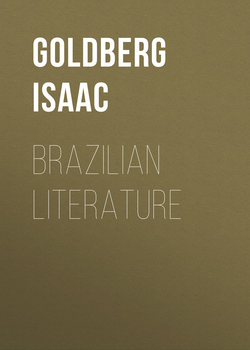Brazilian Literature

Реклама. ООО «ЛитРес», ИНН: 7719571260.
Оглавление
Goldberg Isaac. Brazilian Literature
FOREWORD
PREFACE
PART ONE. AN OUTLINE HISTORY OF BRAZILIAN LITERATURE
CHAPTER I. INTRODUCTORY
CHAPTER II. PERIOD OF FORMATION (1500-1750)
CHAPTER III. PERIOD OF AUTONOMOUS DEVELOPMENT (1750-1830)
CHAPTER IV. THE ROMANTIC TRANSFORMATION (1830-1870)
CHAPTER V. CRITICAL REACTION (1870-1900)
PART II. REPRESENTATIVE PERSONALITIES
I. CASTRO ALVES
II. JOAQUIM MARIA MACHADO DE ASSIS
III. JOSÉ VERISSIMO
IV. OLAVO BILAC
V. EUCLYDES DA CUNHA
VI. MANOEL DE OLIVEIRA LIMA
VII. GRAÇA ARANHA
VIII. COELHO NETTO
IX. FRANCISCA JULIA
X. MONTEIRO LOBATO
Отрывок из книги
The plans for this book, as well as for my Studies in Spanish-American Literature, were conceived during the years 1910-1912 while I was engaged in research work under Professor J. D. M. Ford, head of the Department of Romance Languages, Harvard University. It was not merely that text-books were lacking in both the Spanish-American and the Brazilian fields, for my interest is centred upon aesthetic pleasure rather than upon the depersonalized transmission of facts. A yawning gap of ignorance separated us then from the America that does not speak English, nor was the ignorance all on our side. Commercial opportunities, more than cultural curiosity, served to impart an impetus to the study of Spanish and soon we were reading fiction not only from Spain but from Spanish America. In so far as the mercantile spirit was responsible for this broader literary interest, it performed an undoubted service to art by widening our horizons, but one should be wary about overestimating the permanent gain. Unfortunately, the phonographic iteration of diplomatic platitudes brings continents no nearer, unless it be for the mad purposes of war. If, then, we are, as a people, quite as far as ever from Spanish America, what shall we say of our spiritual distance from the United States of Brazil?
I may be pardoned if I indicate, for example, that the language of Brazil is not Spanish, but Portuguese. And should this simple fact come as a surprise to any reader, let him not be unduly overwhelmed, for he errs in distinguished company. Thus, Gustave Le Bon, – he of crowd-psychology fame, speaks of South America in his Lois psychologiques des peuples (p. 131, 12th ed., 1916) as being predominantly of Spanish origin, divided into numerous republics, of which the Brazilian is one. As late as 1899, Vacher de Lapouge, in his book on L’Aryen could describe Brazil as a “vast negro state returning to a state of savagery,” important, like Mexico, only in a numerical way.1 A small return, it seems, for Brazil’s intellectual adherence to France, yet indicative of inexcusable ignorance not only of Brazil, but of Mexico, where the cultural life, though concentrated, is intense and productive of results that would repay examination. By 1899 Brazil had already produced a fairly respectable array of original creative writers, while Mexican poetry was adding to the wealth of new Spanish verse. Where specialists stray, then, who shall guide the innocent layman? Nor are the Brazilians without their case against the English, as we shall presently note in the discussion of a mooted section of Buckle’s History of Civilization in England, though they owe to more than one earlier Englishman a history of their land. Robert Southey, for notable example, after the collapse of the “pantisocratic” plans harboured by him and Coleridge, found the time to write a History of Brazil that is read today only somewhat less frequently than his poetry.
.....
There is a tenderer aspect to the poet, early noted in his sonnets; despite the wild life he led there are accents of sincerity in his poems of penitence; no less sincere, if less lofty, are his poems of passion, in which love is faunesque, sensual, a thing of hot lips and anacreontic abandon. He can turn a pretty (and empty) compliment almost as gracefully as his Spanish models. But it is really too much to institute a serious comparison between him and Verlaine, as Carvalho would do. Some outward resemblance there is in the lives of the men (yet how common after all, are repentance after ribaldry, and connubial infelicity), but Carvalho destroys his own case in the very next paragraph. For, as he indicates, the early Brazilian’s labours “represent in the history of our letters, it is needful to repeat, the revolt of bourgeois common sense against the ridiculousness of the Portuguese nobility.” How far from all this was the nineteenth century Frenchman, with a sensitive soul delicately attuned to life’s finer harmonies!
I am surprised that no Brazilian has found for Gregorio de Mattos Guerra a parallel spirit much nearer than Verlaine in both time and space. The Peruvian Caviedes was some twenty years younger than his Brazilian contemporary; his life has been likened to a picaresque novel. He was no closet-spirit and his addiction to the flesh, no whit less ardent than Gregorio’s, resulted in the unmentionable affliction. He, too, repented, before marriage rather than after; his wife dying, he surrendered to drink and died four years before the Brazilian, if 1692 is the correct date. As Gregorio de Mattos flayed the luxury of Bahia, so Caviedes guffawed at the sybarites of Lima.45
.....